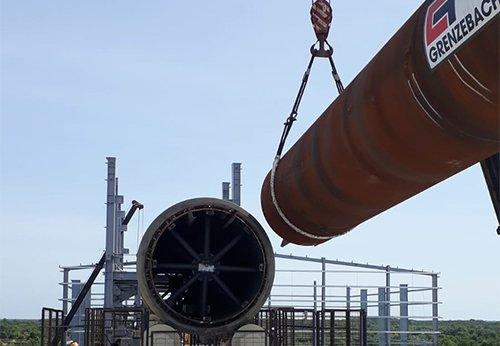The international quartet of cristobalite plants installed by Grenzebach is now complete: Vietnam is the location of the latest of the four plants in which natural quartz (silica) sand is converted into cristobalite. This material stands out in particular for its abrasion resistance and an intensive white pigmentation. It is ideally suited for use in a variety of applications, such as exterior wall paints, exterior rendering products, kitchen worktops, furniture or wall fronts, silicone sealants or road markings.
Increased profitability through in-house production
The specialists from Grenzebach in Bad Hersfeld installed the production facility within 22 months at the customer’s location in Vietnam. "The customer is a company which makes cristobalite products and has so far purchased the raw material. By producing the cristobalite themselves, they can now cover a much larger part of the value chain themselves – and thus increase profitability," says Dr Christoph Habighorst from Grenzebach BSH in Bad Hersfeld. A look at the figures: A tonne of silica sand costs some 20 US dollars, a tonne of cristobalite 200 US dollars. What’s more, cristobalite can also substitute the much more expensive titanium dioxide (some 2,000 US dollars per tonne).
Putting flue gas to good use
From raw material and product prices let’s move to the specifics of the plant built in Vietnam: The raw material silos hold tonnes of silica sand. Feeders add chemical additives to the prepared, i.e. washed, graded and screened sand. It is then dried and pre-heated in a drum dryer. The Grenzebach process technology offers the additional benefit of an efficient exhaust treatment. Pre-heating the material using flue gas exhaust means that the rotary kiln length can be reduced. The rotary kiln is the piece of equipment where the sand is heated to more than 1,200°C and the recrystallization process takes place. The cristobalite sand thus produced is cooled to 700°C in a fluid bed cooler. In a moving bed heat exchanger, which uses water in an indirect process, the temperature is brought down further to a level that allows the product to be handled safely. The plant can produce a total of 80,000 tonnes of cristobalite per year.
Process industry world meets at Powtech
More about cristobalite production plants and process technology from Grenzebach you will find out from 9 – 11 April 2019 at Powtech in Nuremberg in hall 5, booth 5-434.
Grenzebach Group
Albanusstrasse 1
86663 Asbach-Bäumenheim
Telefon: +49 (906) 982-2000
Telefax: +49 (906) 982-108
http://www.grenzebach.com/de/
![]()

